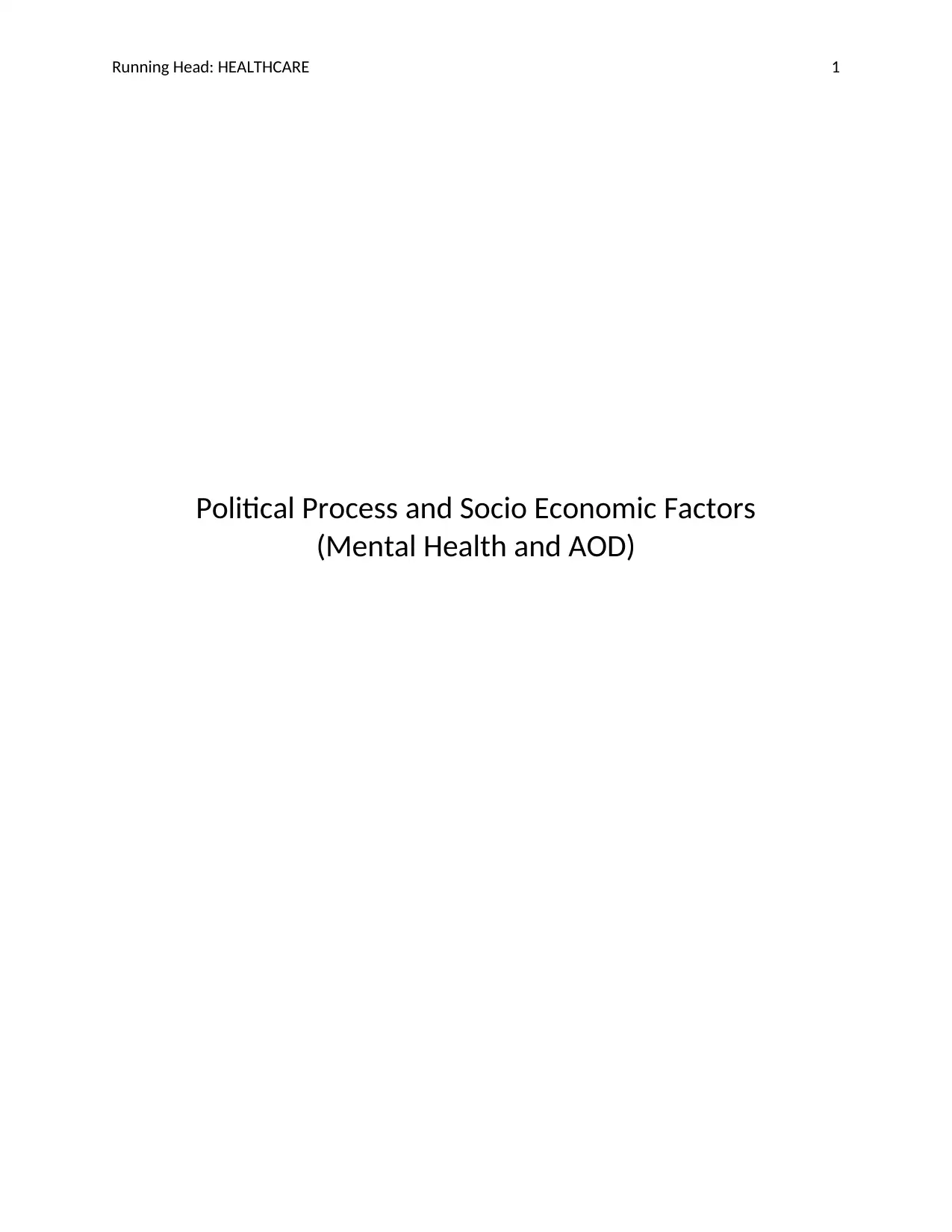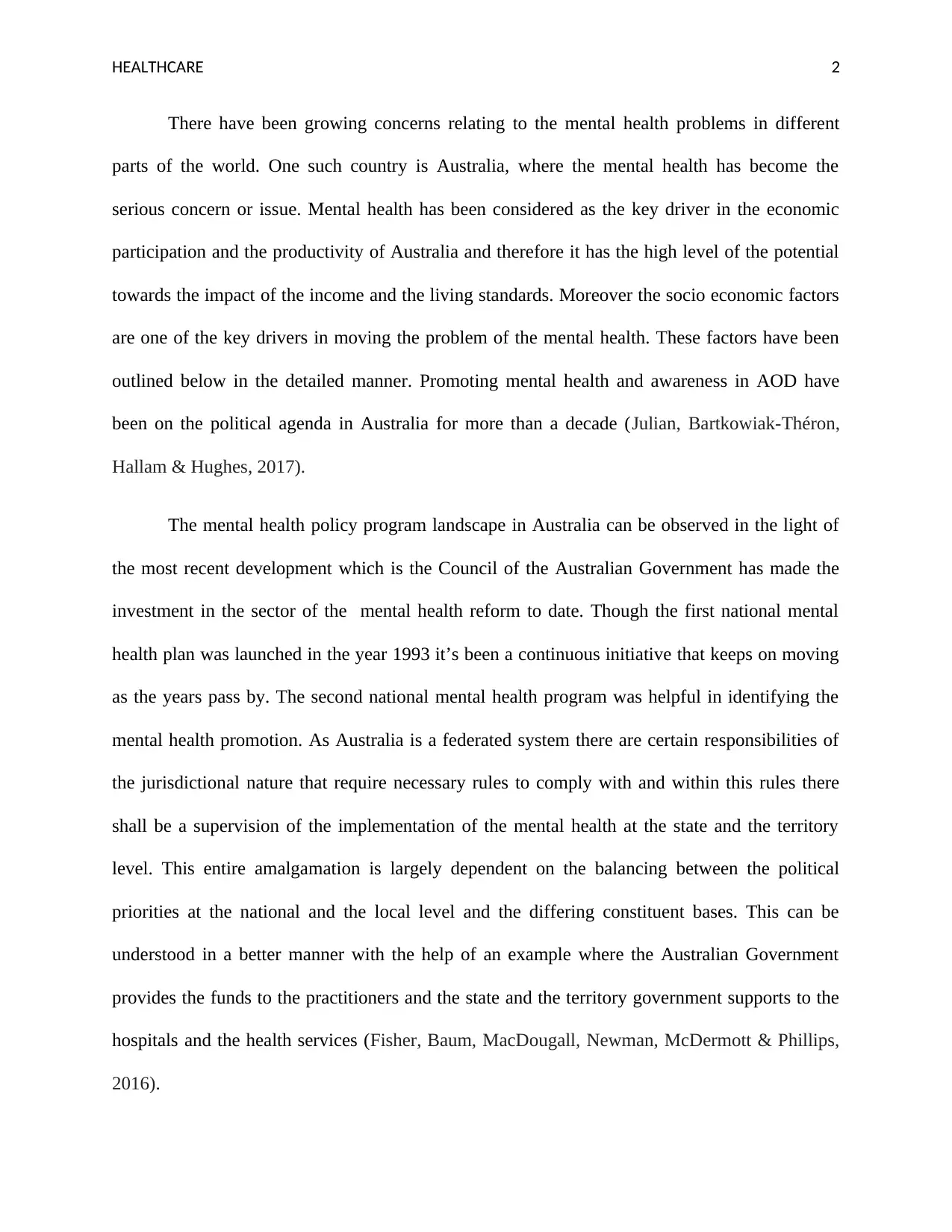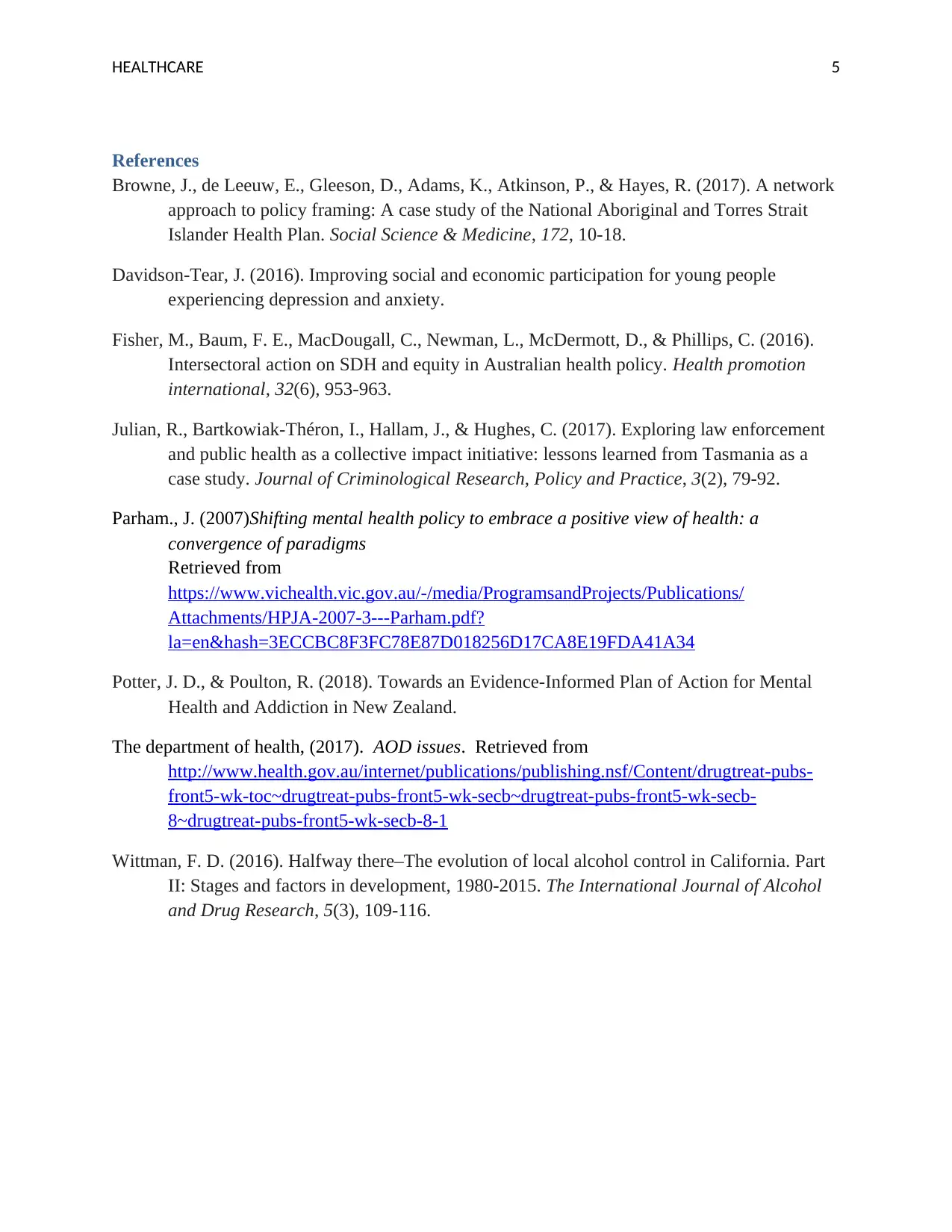Australia's Mental Health & AOD: Political, Socio-Economic Factors
VerifiedAdded on 2023/04/11
|5
|1200
|481
Report
AI Summary
This report delves into the intricate relationship between mental health, alcohol and other drugs (AOD), socio-economic factors, and the political process in Australia. It highlights the growing concerns regarding mental health issues and their impact on the country's economy and productivity. The report emphasizes the significance of socio-economic factors like poverty and debt as key drivers of mental health challenges. It further discusses the influence of political agendas, funding limitations, and shifting demographics on AOD policies. The analysis underscores the importance of public health involvement and a well-defined political process to effectively address mental health and AOD-related issues in Australia, advocating for evidence-based actions and policies.

Running Head: HEALTHCARE 1
Political Process and Socio Economic Factors
(Mental Health and AOD)
Political Process and Socio Economic Factors
(Mental Health and AOD)
Paraphrase This Document
Need a fresh take? Get an instant paraphrase of this document with our AI Paraphraser

HEALTHCARE 2
There have been growing concerns relating to the mental health problems in different
parts of the world. One such country is Australia, where the mental health has become the
serious concern or issue. Mental health has been considered as the key driver in the economic
participation and the productivity of Australia and therefore it has the high level of the potential
towards the impact of the income and the living standards. Moreover the socio economic factors
are one of the key drivers in moving the problem of the mental health. These factors have been
outlined below in the detailed manner. Promoting mental health and awareness in AOD have
been on the political agenda in Australia for more than a decade (Julian, Bartkowiak-Théron,
Hallam & Hughes, 2017).
The mental health policy program landscape in Australia can be observed in the light of
the most recent development which is the Council of the Australian Government has made the
investment in the sector of the mental health reform to date. Though the first national mental
health plan was launched in the year 1993 it’s been a continuous initiative that keeps on moving
as the years pass by. The second national mental health program was helpful in identifying the
mental health promotion. As Australia is a federated system there are certain responsibilities of
the jurisdictional nature that require necessary rules to comply with and within this rules there
shall be a supervision of the implementation of the mental health at the state and the territory
level. This entire amalgamation is largely dependent on the balancing between the political
priorities at the national and the local level and the differing constituent bases. This can be
understood in a better manner with the help of an example where the Australian Government
provides the funds to the practitioners and the state and the territory government supports to the
hospitals and the health services (Fisher, Baum, MacDougall, Newman, McDermott & Phillips,
2016).
There have been growing concerns relating to the mental health problems in different
parts of the world. One such country is Australia, where the mental health has become the
serious concern or issue. Mental health has been considered as the key driver in the economic
participation and the productivity of Australia and therefore it has the high level of the potential
towards the impact of the income and the living standards. Moreover the socio economic factors
are one of the key drivers in moving the problem of the mental health. These factors have been
outlined below in the detailed manner. Promoting mental health and awareness in AOD have
been on the political agenda in Australia for more than a decade (Julian, Bartkowiak-Théron,
Hallam & Hughes, 2017).
The mental health policy program landscape in Australia can be observed in the light of
the most recent development which is the Council of the Australian Government has made the
investment in the sector of the mental health reform to date. Though the first national mental
health plan was launched in the year 1993 it’s been a continuous initiative that keeps on moving
as the years pass by. The second national mental health program was helpful in identifying the
mental health promotion. As Australia is a federated system there are certain responsibilities of
the jurisdictional nature that require necessary rules to comply with and within this rules there
shall be a supervision of the implementation of the mental health at the state and the territory
level. This entire amalgamation is largely dependent on the balancing between the political
priorities at the national and the local level and the differing constituent bases. This can be
understood in a better manner with the help of an example where the Australian Government
provides the funds to the practitioners and the state and the territory government supports to the
hospitals and the health services (Fisher, Baum, MacDougall, Newman, McDermott & Phillips,
2016).

HEALTHCARE 3
Moreover there is a wide relationship between the mental health and the socio economic
factors which are further categorized as the poverty and debt. There is definitely a need of more
health economics and the deliberate research is required on cost effective interventions. The
major factors contributing to the socio economic factors driving the reform agenda majorly
towards the mental health and the alcohol and drug distribution is lack of awareness and the
limitation of the funds available for the improvement of the mental health services. The lower
interest in fulfilling the role as the health professional and the decrease in the supervision of the
national mechanisms are also the reasons contributing towards the changes in the policy of the
mental health. The key factors of the AOD includes the political process, the way of funding,
philosophies, personalities, factional battles, changes in drugs and the major change is the change
in the demographics of the people who are the regular users of it (Davidson-Tear, 2016).
The politics have a heavy impact on the AOD as this factor has the ability to change
however it is also subjected to the philosophical idea. For example recently in Western Australia
showed a supportive consideration towards the heroine whereas the Liberal Party is showed an
opposite reaction towards this. Heavily impacted by the political agenda, funding is also one of
the major and the significant issue in the field of AOD (The department of health, 2017). For few
years in the earlier times the AOD field has been characterized by the faction battles. There are
several out of which some of them relate to the harm reduction whereas other are associated with
the tolerance or abstinence only (Browne, Leeuw Gleeson, Adams, Atkinson & Hayes, 2017). In
the view of many people this kind of policy is unethical and untenable at the same time. The
availability of the drugs is again differentiated on the basis of time and place and it is not
subjected to only time and place rather it is also a major factor in determining the research,
professional education and treatment (Parham, 2007). The users and there demographics also
Moreover there is a wide relationship between the mental health and the socio economic
factors which are further categorized as the poverty and debt. There is definitely a need of more
health economics and the deliberate research is required on cost effective interventions. The
major factors contributing to the socio economic factors driving the reform agenda majorly
towards the mental health and the alcohol and drug distribution is lack of awareness and the
limitation of the funds available for the improvement of the mental health services. The lower
interest in fulfilling the role as the health professional and the decrease in the supervision of the
national mechanisms are also the reasons contributing towards the changes in the policy of the
mental health. The key factors of the AOD includes the political process, the way of funding,
philosophies, personalities, factional battles, changes in drugs and the major change is the change
in the demographics of the people who are the regular users of it (Davidson-Tear, 2016).
The politics have a heavy impact on the AOD as this factor has the ability to change
however it is also subjected to the philosophical idea. For example recently in Western Australia
showed a supportive consideration towards the heroine whereas the Liberal Party is showed an
opposite reaction towards this. Heavily impacted by the political agenda, funding is also one of
the major and the significant issue in the field of AOD (The department of health, 2017). For few
years in the earlier times the AOD field has been characterized by the faction battles. There are
several out of which some of them relate to the harm reduction whereas other are associated with
the tolerance or abstinence only (Browne, Leeuw Gleeson, Adams, Atkinson & Hayes, 2017). In
the view of many people this kind of policy is unethical and untenable at the same time. The
availability of the drugs is again differentiated on the basis of time and place and it is not
subjected to only time and place rather it is also a major factor in determining the research,
professional education and treatment (Parham, 2007). The users and there demographics also
⊘ This is a preview!⊘
Do you want full access?
Subscribe today to unlock all pages.

Trusted by 1+ million students worldwide

HEALTHCARE 4
play a major role in terms of research directions, community attitudes and responses towards the
treatment. Therefore it can be stated that these are the factors that are constantly interlinked and
also becomes the greater part for the government, on the basis of which, it decides the policies
and the reforms in the agenda of the mental health and the alcohol or availability of drugs
(Browne, de Leeuw, Gleeson, Adams, Atkinson & Hayes, 2017).
Mental health policy in Australia has been predominantly of the influential nature by the
public health and also it becomes a necessary step on part of the management to clearly deliver
the articulation of the concepts, actions and the evidence for the promotion of the mental health.
The amalgamation of the different paradigms and perspectives leads to the development in the
policy of the mental health and AOD (Julian, Bartkowiak-Théron, Hallam & Hughes, 2017).
However, the extract of the implementation of the policy can be judged by its real worth and its
ability to effect change. The changes are also subjected to the effect of the external factors and
hence the prices of the drug and the alcohol also are subjected to the fluctuation due to the
changes in the external factors of the environment. Without the proper association with the
public health, it would not be fine for the mental health sector to return to a predominantly
medical model paradigm and to achieve the lost momentum. Hence it can be concluded that the
proper political process must be followed on account of treating the mental health by the
government of Australia, as the political process is one of the most frequent factors affecting the
cycle of the mental health treatment (Potter & Poulton, 2018).
play a major role in terms of research directions, community attitudes and responses towards the
treatment. Therefore it can be stated that these are the factors that are constantly interlinked and
also becomes the greater part for the government, on the basis of which, it decides the policies
and the reforms in the agenda of the mental health and the alcohol or availability of drugs
(Browne, de Leeuw, Gleeson, Adams, Atkinson & Hayes, 2017).
Mental health policy in Australia has been predominantly of the influential nature by the
public health and also it becomes a necessary step on part of the management to clearly deliver
the articulation of the concepts, actions and the evidence for the promotion of the mental health.
The amalgamation of the different paradigms and perspectives leads to the development in the
policy of the mental health and AOD (Julian, Bartkowiak-Théron, Hallam & Hughes, 2017).
However, the extract of the implementation of the policy can be judged by its real worth and its
ability to effect change. The changes are also subjected to the effect of the external factors and
hence the prices of the drug and the alcohol also are subjected to the fluctuation due to the
changes in the external factors of the environment. Without the proper association with the
public health, it would not be fine for the mental health sector to return to a predominantly
medical model paradigm and to achieve the lost momentum. Hence it can be concluded that the
proper political process must be followed on account of treating the mental health by the
government of Australia, as the political process is one of the most frequent factors affecting the
cycle of the mental health treatment (Potter & Poulton, 2018).
Paraphrase This Document
Need a fresh take? Get an instant paraphrase of this document with our AI Paraphraser

HEALTHCARE 5
References
Browne, J., de Leeuw, E., Gleeson, D., Adams, K., Atkinson, P., & Hayes, R. (2017). A network
approach to policy framing: A case study of the National Aboriginal and Torres Strait
Islander Health Plan. Social Science & Medicine, 172, 10-18.
Davidson-Tear, J. (2016). Improving social and economic participation for young people
experiencing depression and anxiety.
Fisher, M., Baum, F. E., MacDougall, C., Newman, L., McDermott, D., & Phillips, C. (2016).
Intersectoral action on SDH and equity in Australian health policy. Health promotion
international, 32(6), 953-963.
Julian, R., Bartkowiak-Théron, I., Hallam, J., & Hughes, C. (2017). Exploring law enforcement
and public health as a collective impact initiative: lessons learned from Tasmania as a
case study. Journal of Criminological Research, Policy and Practice, 3(2), 79-92.
Parham., J. (2007)Shifting mental health policy to embrace a positive view of health: a
convergence of paradigms
Retrieved from
https://www.vichealth.vic.gov.au/-/media/ProgramsandProjects/Publications/
Attachments/HPJA-2007-3---Parham.pdf?
la=en&hash=3ECCBC8F3FC78E87D018256D17CA8E19FDA41A34
Potter, J. D., & Poulton, R. (2018). Towards an Evidence-Informed Plan of Action for Mental
Health and Addiction in New Zealand.
The department of health, (2017). AOD issues. Retrieved from
http://www.health.gov.au/internet/publications/publishing.nsf/Content/drugtreat-pubs-
front5-wk-toc~drugtreat-pubs-front5-wk-secb~drugtreat-pubs-front5-wk-secb-
8~drugtreat-pubs-front5-wk-secb-8-1
Wittman, F. D. (2016). Halfway there–The evolution of local alcohol control in California. Part
II: Stages and factors in development, 1980-2015. The International Journal of Alcohol
and Drug Research, 5(3), 109-116.
References
Browne, J., de Leeuw, E., Gleeson, D., Adams, K., Atkinson, P., & Hayes, R. (2017). A network
approach to policy framing: A case study of the National Aboriginal and Torres Strait
Islander Health Plan. Social Science & Medicine, 172, 10-18.
Davidson-Tear, J. (2016). Improving social and economic participation for young people
experiencing depression and anxiety.
Fisher, M., Baum, F. E., MacDougall, C., Newman, L., McDermott, D., & Phillips, C. (2016).
Intersectoral action on SDH and equity in Australian health policy. Health promotion
international, 32(6), 953-963.
Julian, R., Bartkowiak-Théron, I., Hallam, J., & Hughes, C. (2017). Exploring law enforcement
and public health as a collective impact initiative: lessons learned from Tasmania as a
case study. Journal of Criminological Research, Policy and Practice, 3(2), 79-92.
Parham., J. (2007)Shifting mental health policy to embrace a positive view of health: a
convergence of paradigms
Retrieved from
https://www.vichealth.vic.gov.au/-/media/ProgramsandProjects/Publications/
Attachments/HPJA-2007-3---Parham.pdf?
la=en&hash=3ECCBC8F3FC78E87D018256D17CA8E19FDA41A34
Potter, J. D., & Poulton, R. (2018). Towards an Evidence-Informed Plan of Action for Mental
Health and Addiction in New Zealand.
The department of health, (2017). AOD issues. Retrieved from
http://www.health.gov.au/internet/publications/publishing.nsf/Content/drugtreat-pubs-
front5-wk-toc~drugtreat-pubs-front5-wk-secb~drugtreat-pubs-front5-wk-secb-
8~drugtreat-pubs-front5-wk-secb-8-1
Wittman, F. D. (2016). Halfway there–The evolution of local alcohol control in California. Part
II: Stages and factors in development, 1980-2015. The International Journal of Alcohol
and Drug Research, 5(3), 109-116.
1 out of 5
Related Documents
Your All-in-One AI-Powered Toolkit for Academic Success.
+13062052269
info@desklib.com
Available 24*7 on WhatsApp / Email
![[object Object]](/_next/static/media/star-bottom.7253800d.svg)
Unlock your academic potential
Copyright © 2020–2026 A2Z Services. All Rights Reserved. Developed and managed by ZUCOL.





